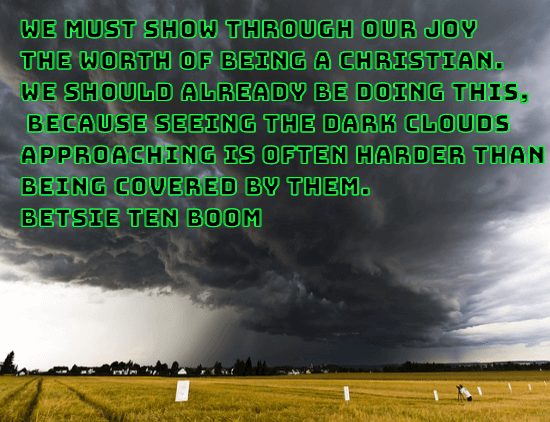| site search by freefind |
- Home
- Scripture Snapshots
- Fear and Distress
[If you purchase anything on this site, I may make a commission. Disclosure Policy]
Reacting In Times Of Great Fear And Distress
When the messengers returned to Jacob, they said, “We went to your brother Esau, and now he is coming to meet you, and four hundred men are with him.” In great fear and distress Jacob divided the people who were with him into two groups, and the flocks and herds and camels as well. He thought, “If Esau comes and attacks one group, the group that is left may escape.” Then Jacob prayed… Gen. 32:6-9, NIV
Jacob was in a terrible position. He had cheated his brother. That guilt had probably played on his nerves for twenty years. Now he had to face the brother he had wronged. He certainly could not forget that twenty years ago, his brother had been planning to kill him. Then he learned that his brother is coming out to meet him with four hundred men. Not good.
Sitemap -
Newsletter -
Statement Of Faith -
Donate
Follow us on social media for daily Scripture comments and more at MeWe, Facebook or YouTube.
I am sure you can imagine the “great fear and distress” that Jacob felt. Perhaps you have also faced overwhelming fear when you learned about something that was likely to happen that could change or ruin your life forever. How do you provide for your family when you lose your job? How do you survive when your husband walks out, leaving you with three kids and no source of income? What happens when a close friend or family member dies? What do you do when you are in Covid lockdown and cut off from your normal social networks?
In Jacob’s case, he had caused the problem and was reaping the consequences. It was a real possibility that Esau had carried a grudge and was about to exact revenge. But it doesn’t have to be that way. Sometimes we face ‘great fear and distress’ for situations that we did not cause and have no control over. Sometimes the threat isn’t even real except in our minds. But our emotions react on what we perceive as real, not on what is actually real. We can have just as great of a fear over something that, in reality, is not true, as we can over a real threat.
Some people allow fear to paralyze them. They go into a state of mind where they cannot function. Like a deer caught in the headlights, they just stand there until the car either hits them or shows itself to be a mirage.
What did Jacob do?
Jacob was terrified, but he thought about what he could do to lessen the impact of the situation. He knew he could not avoid it or run away from it. He wasn’t paralyzed. He was responsible for the people with him. He thought about how to protect at least some of them. He came up with a plan, and he put it into action.
When faced with ‘great fear and distress,’ we need to keep our minds under control. If we don’t, they may lead us to the place where we are paralyzed and cannot do anything. We have the ability to control what we choose to think about. It may be an intense and running battle, but it is a battle we must win. Sometimes it takes baby steps…just getting through the day…or the hour…or the next five minutes… Figure out what needs to be done, what can be done, and focus on accomplishing that. Then move on to the next thing. As many people have experienced, this is not easy when emotions are fraying, and our mind feels like it is going insane. At times like this, we don’t have to see the big picture, we have to focus on doing what is in front of us: getting dressed, making a meal, going to work, whatever…
‘Then Jacob prayed…’ Jacob knew that ultimately God was the only One Who could help him. He did what he could; then he turned to God. Take time to read his prayer in verses 9-12.
He began by remembering that God had worked in the life of his father and forefathers. God had worked for them, and He would be involved in his life. If you have had a Godly family line, consider how God has proven Himself there. If you are at the beginning of a new Godly line, consider that as a member of the family of God, every Christian who has ever lived is in your family line! That’s right…Abraham…Moses…Paul…Hudson Taylor…Amy Carmichael…they are all in your family line. Consider how God faithfully worked for them in difficult situations and fearful times.

Next, he reminded God of His promises. If God has made specific promises alive to your heart, remind Him of them. [That’s why it is good to write them down when you receive them, in order that you can refer to them when you are not thinking quite so clearly.] It is powerful to pray God’s promises. If you can’t think of anything specific, then bring up God’s general promises that are true for all His people, including you. Jesus, You promised to love me at all times. Jesus, You promised never to leave me. Jesus, You promised to protect and provide for me. Jesus, You promised Your peace and joy. Jesus, You promised…
Jacob then showed he wasn’t standing in pride and arrogance as if God’s owed him something. He recognized he was unworthy of God’s attention. We receive the gifts of God because of His love and grace alone. We do nothing to deserve them. Yes, we come before God with confidence as adopted sons and daughters, but it is because of Who He Is not because of who we are.
He also recognized that everything that he had in life was a gift from God. Yes, he had worked hard to earn his wives and wealth, but ultimately they came from God. It is God alone Who can give success to our efforts. It is good to recognize that and be thankful for it. No matter where you are now, God has been at work in your life. Thank Him for it.
Then he got to his prayer request - this is often where we start! He honestly shared with God what he was feeling and asked for help. Sometimes we are afraid to tell God how we really feel. Although we realize on an intellectual level that God knows how we feel and what we think, emotionally we often still fear rejection or condemnation. We need to come to a place where we can honestly share with Jesus exactly how we are feeling or what we are thinking. It is to be the ultimate open relationship with no hidden parts…but it is a process.
Finally, he ended his prayer by again recounting the promises of God. It was a statement of faith that if God said it, He would do it. Sometimes all we have to hold onto is the Word of God. That is enough.
For more information about Glenn Davis, see our About Glenn page or visit Glenn Davis Books.
Follow us on social media for daily Scripture comments and more at MeWe, Facebook or YouTube.
Sitemap -
Newsletter -
Statement Of Faith -
Donate
Sign up for our free monthly newsletter or take one of our free Bible Study courses.
Please note: We no longer have the commenting feature [maybe again in the future]. Joshua Institute students who have questions or comments on their courses can use the contact button and mention the course name and lesson number in the email. Thank you. Glenn

Privacy - Disclosure

